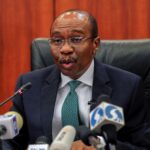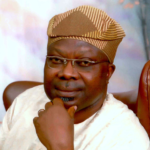Nigerians Struggle as Inflation Hits 33.88%
Nigeria’s inflation rate climbed to 33.88% in October 2024, a significant increase from September’s 32.70%, according to the National Bureau of Statistics (NBS). This represents a year-on-year jump of 6.55 percentage points compared to October 2023, marking an alarming rise that has left Nigerians in turmoil.
“This rate is beyond troubling,” said Lagos-based economist, Dr. Akin Ajayi. “We expected a decline due to seasonal harvests, but the persistent drivers—fuel price hikes, naira depreciation, and insecurity—have only worsened the situation.”
Join our WhatsApp ChannelNigerians React to Inflation Spike
Many Nigerians have expressed their frustrations and fears over the continued rise in inflation. For them, the soaring cost of living has led to difficult choices and heightened anxiety.
“I can’t feed my family like I used to,” lamented Maryam Ibrahim, a POS Merchant in Ajao Estate, Lagos. “A bag of rice that sold for N25,000 last year now costs over N100,000. Even bread is a luxury.”
For Chike Eze, an Uber driver, fuel costs have become unbearable. “How can I survive? Fuel prices have skyrocketed to over N1,200 per litre. My earnings can’t keep up with my expenses,” he said.
Another resident, Aisha Lawal, shared her struggles. “I had to pull my kids out of private school because the fees are too high. Even basic things like palm oil and vegetables are now out of reach for many families like mine,” she explained.
Young Nigerians like Adebola Ojo, a fresh graduate of University of Lagos, feel stuck. “I planned to start a small business(fashion designing), but everything is expensive now—from raw materials to transportation,” he said.
Experts Highlight Key Drivers of Inflation
Economists have identified several factors fuelling Nigeria’s inflation. Among them are rising food and transportation costs, the removal of fuel subsidies, and the naira’s depreciation.
READ ALSO: Nigeria’s Inflation Rate Hits 33.88% In October Amid Fresh Fuel Price Spike
“Flooding and insecurity in agricultural regions have disrupted food production,” explained agricultural economist Prof. Amaka Ugwuanyi. “These issues drive up food prices, which make up a large part of the inflation index.”
Dr. Ajayi also emphasised the ripple effects of high energy costs. “Transportation is the backbone of the economy. When petrol prices increase, everything else follows, from food to services,” he noted.
How Inflation Affects Nigerians
The impact of inflation extends beyond rising prices. It is reshaping the economic landscape and creating widespread hardship across sectors.
“Many hotels are shutting down because customers can’t afford the higher rates,” said Samuel Dike, a hotel manager. “Our operational costs are through the roof, and we’re barely surviving.”
Similarly, small business owners are feeling the heat. “I had to lay off half my staff,” said Blessing Okoro, who owns a small bakery in Oshodi. “Flour, sugar, and other inputs have doubled in price.”
For others like Musa Bello on Facebook, insecurity and high input costs are compounding the crisis. “Fertiliser and seeds are expensive. Even after harvest, transporting goods is costly because of fuel prices,” he said.
Calls for Government Action
Many Nigerians are calling on the government to implement urgent measures to address inflation. The rising cost of living has pushed many into poverty, with little hope of relief in sight.
“We need policies that stabilise food prices,” said Prof. Ugwuanyi. “Subsidies on agricultural inputs and better security in farming regions could help mitigate this crisis.”
Dr. Ajayi suggested currency stabilisation as a critical step. “A strong naira can help control import costs. The Central Bank must work on policies that rebuild confidence in the currency,” he said.
A Grim Outlook for December
Analysts predict that Nigeria’s inflation rate could exceed 35% by December, driven by seasonal factors like holiday demand and continued naira weakness.
For now, many Nigerians remain uncertain about the future. “Life keeps getting harder,” said Ibrahim Musa, a taxi driver in Lagos. “I just hope things change soon, or we won’t survive.”
Emmanuel Ochayi is a journalist. He is a graduate of the University of Lagos, School of first choice and the nations pride. Emmanuel is keen on exploring writing angles in different areas, including Business, climate change, politics, Education, and others.


















Follow Us